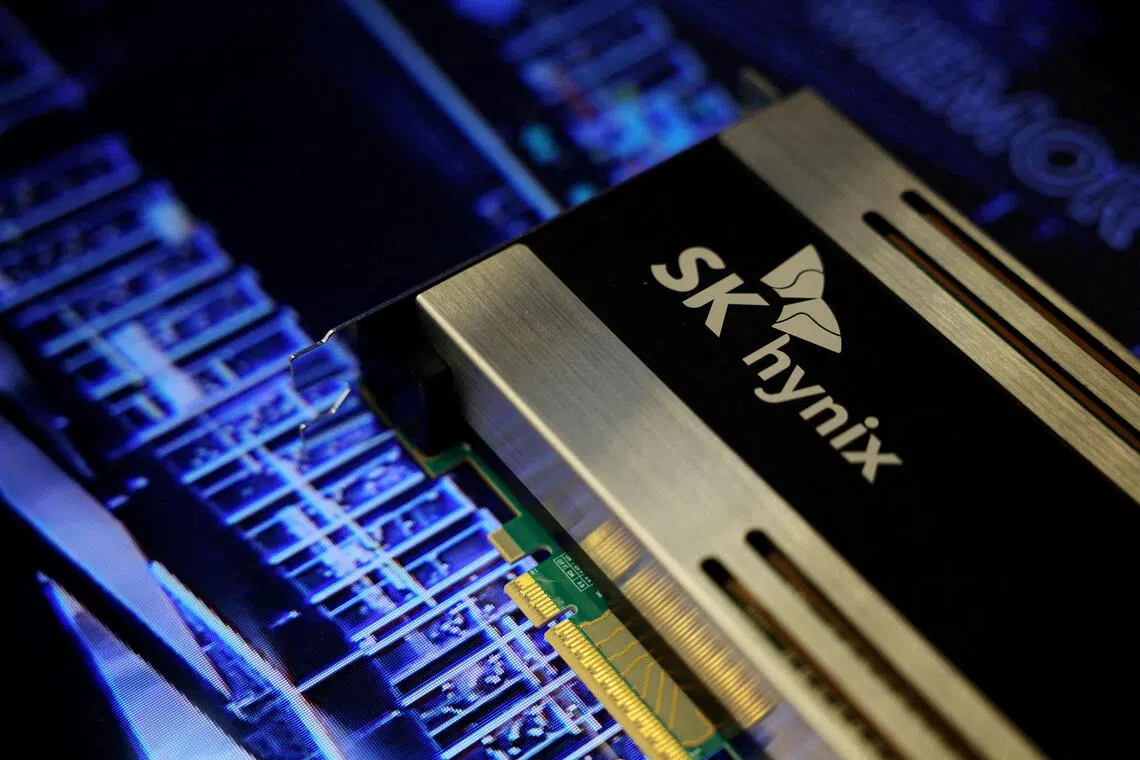SK Hynix sells entire 2026 chip line-up in strong AI demand signal
Sign up now: Get ST's newsletters delivered to your inbox

SK Hynix reported a 62 per cent jump in profit and said customers have already secured its entire memory chip line-up for 2026.
PHOTO: REUTERS
SEOUL - SK Hynix reported a 62 per cent jump in quarterly profit and said customers have already secured its entire memory chip line-up for2026, illustrating how a global artificial intelligence infrastructure build-out is ratcheting up sector-wide demand.
The South Korean company logged a record operating profit of 11.4 trillion won (S$10.3 billion) in the September quarter, slightly above the average of analyst estimates. Sales climbed to 24.45 trillion won.
The company, which is the leading supplier of cutting-edge high-bandwidth memory (HBM) chips to Nvidia, said it will begin supplying next-generation HBM4 components in this quarter after completing negotiations, without specifying who the customers are.
The company plans to expand production capacity in 2026, with its full 2026 offering in both Dram and Nand spoken for, SK Hynix said in a statement. Its shares rose as much as 4.1 per cent in premarket trading on Oct 29.
“The insatiable HBM demand is likely to persist into next year, accelerated by massive projects like OpenAI’s Stargate”, on top of demand from hyperscalers and countries pursuing their own sovereign AI, said Mr Greg Roh, an analyst with Hyundai Motor Securities.
Surging AI demand is also prompting greater sales of enterprise solid state drives, boding well for Hynix, he said.
The results defy caution from some investors that market valuations have run too high, given the lack of mainstream AI applications and the circular nature of AI infrastructure financing and supply deals.
They warn that OpenAI and Nvidia are fuelling an increasingly complex web of business transactions that is artificially propping up the trillion-dollar AI boom.
“I don’t believe we’re in an AI bubble,” Nvidia chief Jensen Huang said,
SK Hynix’s rapid growth underscores how OpenAI and big tech firms like Meta Platforms are hoovering up the chips, servers and other gear necessary to train and operate AI services.
Shares in SK Hynix – a primary beneficiary of that construction boom – have roughly tripled in 2025.
In the longer run, many investors and tech firms believe the advent of AI will trigger a “super cycle” in the memory market, particularly for the HBMs required to make AI accelerators and power services like ChatGPT.
New entrants such as Qualcomm are also likely to further push up demand for high-end memory chips.
OpenAI alone has struck deals for data centres and chips that could easily top US$1 trillion (S$1.3 trillion).
SK Hynix and rival Samsung Electronics have secured initial agreements to supply the US start-up’s Stargate project, reinforcing their lead in the memory sphere. They estimate that the project will need more than twice the world’s current HBM capacity.
The global semiconductor market could grow at double-digit percentages for three consecutive years, a streak the industry has not witnessed in three decades, Eugene Investment & Securities C. analyst Lee Seung-woo projected.
That focus on premium AI products is constraining the supply of more conventional memory.
SK Hynix and Samsung raised traditional memory chip prices by up to 30 per cent for the fourth quarter, according to a local media report. Several producers of older types of memory, including Nanya Technology, have seen their share price more than double since the beginning of 2025.
The impact is being felt across the industry. Xiaomi executives last week said it jacked up the price tag on its latest smartphones in part because of the rising cost of memory chips. BLOOMBERG


